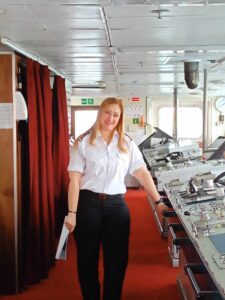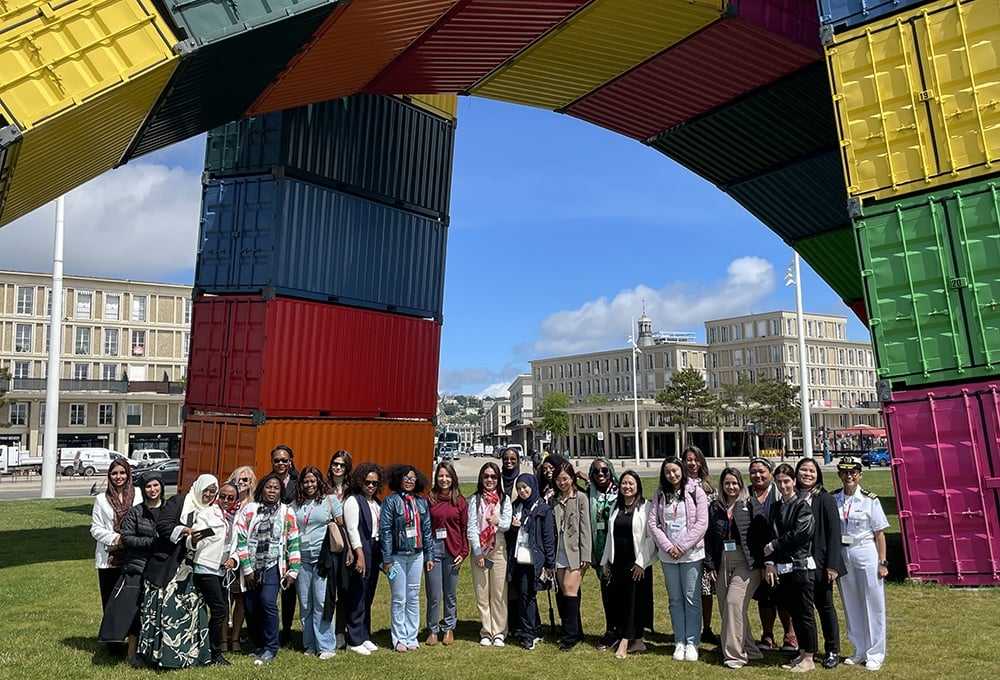Today, women represent only 1.2% percent of the global seafarer workforce as per the BIMCO/ICS 2021 Seafarer Workforce Report.
Female maritime officials from 26 countries have completed intensive training to boost their skills in managing and operating ports.
The 21st Women in Port Management seminar, sponsored by IMO and organized in collaboration with France’s leading port, HAROPA Port, was delivered by the Institut Portuaire d’Enseignement et de Recherche (IPER) from 10 to 21 June in Le Havre, France.
The training equipped senior officials from developing countries with the latest insights and knowledge related to port operations and management, including the impact of new technologies.
Lectures covered a range of port matters from security, marketing and tariffs and logistics, to facilitation of maritime traffic, ship/port interface and concession contracts.
Participants shared their own knowledge and experiences around port management, emerging technical issues and the implementation of related IMO conventions.
The ‘Women in port management’ seminar is an annual joint initiative of IMO, IPER and HAROPA Port, aimed at improving the efficiency of ports in developing countries, while promoting gender equality in the sector.
This year, IMO’s Women in Maritime programme sponsored the participation of officials from Antigua and Barbuda, Argentina, Brazil, Cambodia, Cameroon, Comoros, Côte d’Ivoire, Djibouti, Dominica, Egypt, Georgia, Guatemala, Jamaica, Madagascar, Maldives, Malaysia, Mexico, Mongolia, Morocco, Nigeria, Philippines, Somalia, Thailand, Togo, Tonga and Viet Nam.
Created in 1988, the Women in Maritime programme aims to enhance the contribution of women as key maritime stakeholders through professional training, visibility and recognition.

Women in Maritime – IMO’s gender programme
It is noteworthy Today, women represent only 1.2% percent of the global seafarer workforce as per the BIMCO/ICS 2021 Seafarer Workforce Report. This represents a positive trend in gender balance, with the report estimating 24,059 women serving as seafarers, which is a 45.8% increase compared with the 2015 report.
Within this historically male dominated industry, IMO has been making a concerted effort to help the industry move forward and support women to achieve a representation that is in keeping with twenty-first century expectations.
Within the framework of maritime development, and through its Women in Maritime programme, under the slogan: “Training-Visibility-Recognition”, IMO has taken a strategic approach towards enhancing the contribution of women as key maritime stakeholders. IMO continues to support the participation of women in both shore-based and sea-going posts.
IMO is strongly committed to helping its Member States achieve the UN 2030 Agenda for Sustainable Development and the 17 Sustainable Development Goals (SDGs), particularly Goal 5 “Achieve gender equality and empower all women and girls”.
IMO’s gender programme was initiated in 1988. At that time, only a few maritime training institutes opened their doors to female students. Since then, IMO’s gender and capacity-building programme has helped put in place an institutional framework to incorporate a gender dimension into IMO’s policies and procedures. This has supported access to maritime training and employment opportunities for women in the maritime sector.
How is IMO helping women in the maritime community?
IMO supports gender equality and the empowerment of women through gender specific fellowships; by facilitating access to high-level technical training for women in the maritime sector in developing countries; by creating the environment in which women are identified and selected for career development opportunities in maritime administrations, ports and maritime training institutes; and by facilitating the establishment of professional women in maritime associations, particularly in developing countries.




